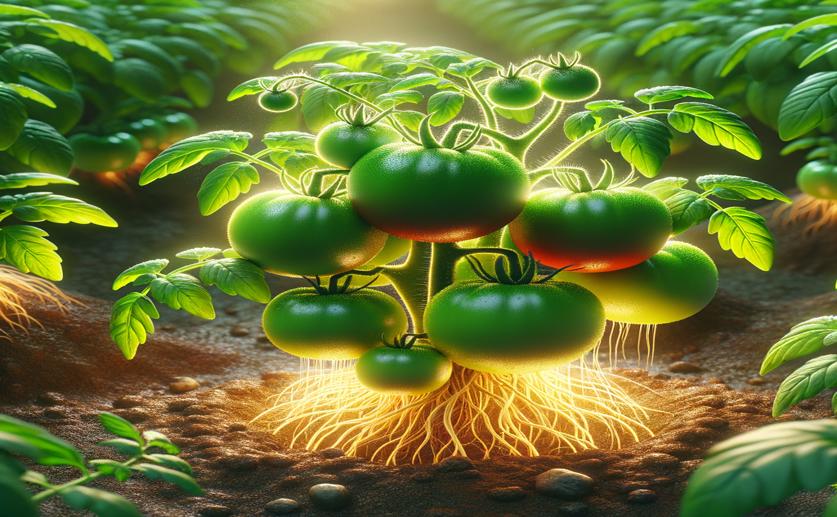How Green-Made Selenium Helps Tomato Plants Beat Cadmium Stress

Image Source: Natural Science News, 2024
Key Findings
- In Lahore, SeNPs from Nigella sativa improved tomato growth in cadmium-contaminated soil
- SeNPs increased fruit yield by over 100% and reduced cadmium absorption in roots
- Treated plants had higher levels of chlorophyll and antioxidants like lycopene and ascorbic acid
Understanding how plants cope with toxic heavy metals in the soil is an important area of research, particularly for food crops like tomatoes. Cadmium (Cd) is one such heavy metal that can be absorbed by plant roots, leading to stunted growth and diminished yields. A recent study by researchers at Lahore College for Women University[1] has explored an innovative approach to protect tomato plants from the adverse effects of cadmium using selenium nanoparticles (SeNPs).
The study focused on evaluating the impact of SeNPs, which were synthesized using water extract of Nigella sativa, a plant known for its medicinal properties. These nanoparticles were applied to tomato plants through two different methods: foliar spray (directly onto the leaves) and soil drench (applied to the soil). Concentrations of 0, 100, and 300 mg/L were tested to determine their effectiveness in a cadmium-contaminated environment.
The results were promising. In cadmium-stressed plants, growth parameters such as shoot length, root length, number of branches and leaves, and leaf area were significantly improved by the application of SeNPs, particularly when applied via soil drench. For example, root length was increased by 51% compared to plants not treated with SeNPs. Moreover, the SeNPs dramatically boosted fruit yield and weight by over 100%, and they reduced the time it took for the plants to start bearing fruit.
In addition to these growth improvements, the SeNPs had a positive effect on various biochemical markers within the tomato plants. Pigments like chlorophyll, which are crucial for photosynthesis, were more abundant in plants treated with SeNPs, especially when applied as a foliar spray. The study also found a 75% increase in lycopene content, an important antioxidant found in tomatoes.
This ties into earlier research that has highlighted the role of antioxidants in plant stress responses. Flavonoids, a class of antioxidants, have been shown to help plants reduce the generation of reactive oxygen species (ROS) and mitigate the damage they cause[2]. Similarly, ascorbic acid (AsA) is another potent antioxidant that not only scavenges ROS but also plays a role in key plant processes, including growth and stress response[3]. The current study found that SeNPs improved the ascorbic acid content in the tomato plants, suggesting a potential synergy between SeNPs and the plant's natural antioxidant mechanisms.
The study also delved into the activities of stress enzymes, which are proteins that help protect plants from oxidative damage. Under cadmium stress, these enzymes showed increased activity, indicating that the tomato plants were responding to the heavy metal challenge. This observation is consistent with previous findings that plants ramp up their antioxidative defenses in response to cadmium-induced oxidative stress[4].
One particularly interesting aspect of the study was the finding that SeNPs reduced the absorption of cadmium in tomato roots. This is significant because it suggests a possible mechanism by which SeNPs confer their protective effects. While cadmium itself is not redox-active and cannot directly generate ROS, it can induce oxidative stress within the plant[4]. By limiting cadmium uptake, SeNPs may help to mitigate the cascade of stress responses triggered by the heavy metal.
Furthermore, selenium's role in mitigating heavy metal stress has been previously observed. For instance, selenium was found to reverse cadmium-induced decreases in growth and biochemical changes in rape seedlings[5]. The current study expands on this by demonstrating the effectiveness of selenium in nanoparticle form, which may offer advantages in terms of stability and delivery.
In summary, the research from Lahore College for Women University provides valuable insights into how selenium nanoparticles can be used to protect tomato plants from the toxic effects of cadmium. By enhancing growth and yield, increasing the content of important antioxidants, and reducing cadmium absorption in roots, SeNPs offer a promising strategy for managing heavy metal stress in crops. This study not only adds to our understanding of plant stress physiology but also has practical implications for agriculture, especially in areas where soil contamination with heavy metals is a concern.
SustainabilityBiotechPlant Science
References
Main Study
1) Alleviation potential of green-synthesized selenium nanoparticles for cadmium stress in Solanum lycopersicum L: modulation of secondary metabolites and physiochemical attributes.
Published 4th April, 2024
Journal: Plant cell reports
Issue: Vol 43, Issue 4, Apr 2024
Related Studies
5) The protective role of selenium in rape seedlings subjected to cadmium stress.
Journal: Journal of plant physiology, Issue: Vol 165, Issue 8, May 2008
Related Articles





 16th February, 2024 | Phil Stevens
16th February, 2024 | Phil Stevens